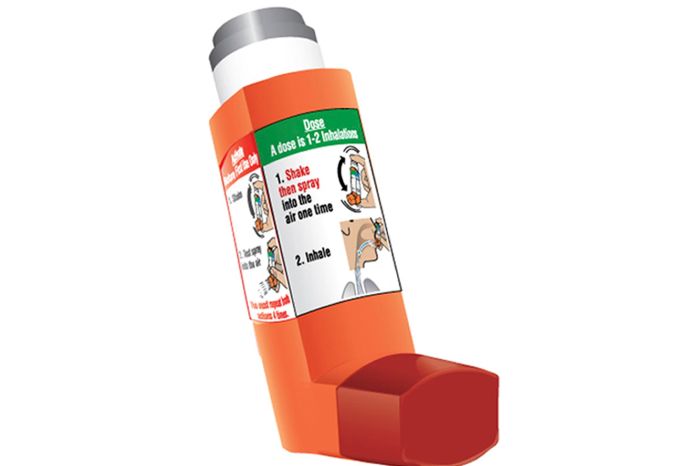Over the counter inhaler – Over-the-counter inhalers offer a convenient and accessible option for individuals seeking relief from respiratory symptoms like congestion, coughing, and wheezing. These inhalers contain various active ingredients that work to relax airways, reduce inflammation, and ease breathing. They are often used for temporary relief of mild to moderate respiratory issues, providing a quick and effective solution for common ailments.
However, it’s crucial to understand the different types of over-the-counter inhalers, their active ingredients, and their potential side effects before using them. Choosing the right inhaler for your specific needs is essential, and consulting with a healthcare professional before using any new medication is always recommended.
OTC Inhalers vs. Prescription Inhalers

Over-the-counter (OTC) inhalers and prescription inhalers are both used to treat respiratory conditions, but they differ in several key aspects. Understanding these differences is crucial for making informed decisions about your respiratory health.
Active Ingredients and Strength
OTC inhalers typically contain lower doses of active ingredients compared to prescription inhalers. This is because OTC inhalers are designed to provide temporary relief for mild symptoms, while prescription inhalers are intended for ongoing management of more severe conditions.
- OTC Inhalers: OTC inhalers typically contain a lower dose of active ingredients, such as epinephrine or levo-albuterol, which are bronchodilators that help open up the airways.
- Prescription Inhalers: Prescription inhalers can contain a wider range of active ingredients, including corticosteroids, long-acting bronchodilators, and combination therapies. These medications are more potent and are used to control chronic respiratory conditions like asthma and chronic obstructive pulmonary disease (COPD).
Potential Side Effects
Both OTC and prescription inhalers can cause side effects, but the severity and frequency of these side effects can vary depending on the specific medication and the individual’s sensitivity.
- OTC Inhalers: Common side effects of OTC inhalers include tremors, headache, and nervousness. These side effects are usually mild and temporary.
- Prescription Inhalers: Prescription inhalers can cause a wider range of side effects, including oral thrush (fungal infection in the mouth), hoarseness, and increased risk of pneumonia. Some prescription inhalers, such as corticosteroids, can also suppress the immune system.
When a Prescription Inhaler Might Be Necessary
A prescription inhaler is typically necessary when:
- Symptoms are severe or frequent: If you experience frequent or severe respiratory symptoms, such as wheezing, shortness of breath, or coughing, a prescription inhaler might be necessary to effectively manage your condition.
- OTC inhalers provide insufficient relief: If OTC inhalers do not provide adequate relief from your respiratory symptoms, your doctor may recommend a prescription inhaler.
- Underlying respiratory condition: If you have a diagnosed respiratory condition, such as asthma or COPD, your doctor will likely prescribe a specific inhaler to manage your condition.
Alternatives to OTC Inhalers

While over-the-counter inhalers can provide temporary relief from respiratory symptoms, it’s important to explore alternative options that may address the underlying cause of your respiratory issues. These alternatives can be valuable tools for managing your respiratory health and reducing your reliance on medications.
Home Remedies for Respiratory Issues
Home remedies offer a natural approach to managing respiratory symptoms. These remedies can help soothe irritation, loosen mucus, and promote healing.
- Steam inhalation: Inhaling steam can help loosen mucus and open airways. You can achieve this by taking a hot shower or bath, or by using a humidifier or vaporizer.
- Saltwater gargles: Gargling with warm salt water can soothe a sore throat and help clear mucus from the back of the throat.
- Honey: Honey has antibacterial and anti-inflammatory properties that can help soothe a cough and reduce throat irritation.
- Ginger: Ginger has anti-inflammatory properties that can help reduce respiratory inflammation and congestion. You can consume ginger in tea, soup, or by chewing on a small piece of ginger root.
Lifestyle Changes to Improve Respiratory Health
Making positive changes to your lifestyle can significantly improve your respiratory health. These changes can help prevent respiratory issues and manage existing conditions.
- Quit smoking: Smoking is a major risk factor for respiratory diseases, including asthma, chronic obstructive pulmonary disease (COPD), and lung cancer. Quitting smoking can dramatically improve your lung function and overall health.
- Avoid secondhand smoke: Exposure to secondhand smoke can be just as harmful as smoking yourself. Avoid areas where people smoke and advocate for smoke-free environments.
- Exercise regularly: Regular exercise strengthens your respiratory muscles and improves lung capacity. Aim for at least 30 minutes of moderate-intensity exercise most days of the week.
- Maintain a healthy weight: Obesity can put extra strain on your lungs and increase your risk of respiratory problems. Maintaining a healthy weight can help improve your respiratory function.
- Manage stress: Stress can worsen respiratory symptoms. Find healthy ways to manage stress, such as yoga, meditation, or spending time in nature.
Other Over-the-Counter Options
Besides inhalers, there are other over-the-counter options available for managing respiratory symptoms.
- Decongestants: Decongestants can help reduce nasal congestion by shrinking swollen blood vessels in the nasal passages. However, they can cause side effects such as insomnia and nervousness.
- Antihistamines: Antihistamines block the effects of histamine, a chemical that is released during allergic reactions. They can help relieve symptoms of allergies, such as sneezing, runny nose, and itchy eyes.
- Cough suppressants: Cough suppressants can help reduce the frequency and severity of coughs. However, they should not be used for coughs that are productive, as this can interfere with the body’s natural ability to clear mucus from the lungs.
Comparing Alternatives
| Alternative | Pros | Cons |
|---|---|---|
| Home remedies | Natural, readily available, low cost | May not be effective for all conditions, can take time to work |
| Lifestyle changes | Long-term benefits for respiratory health, can reduce reliance on medication | May require significant effort and commitment, can take time to see results |
| Other OTC options | Can provide temporary relief from symptoms, readily available | May have side effects, can mask underlying conditions |
Prevention and Management of Respiratory Issues: Over The Counter Inhaler
Respiratory issues can significantly impact your quality of life. Taking proactive steps to prevent these problems and manage existing conditions is crucial. This section explores strategies for both prevention and management, empowering you to maintain healthy respiratory function.
Preventing Respiratory Issues, Over the counter inhaler
Preventing respiratory issues involves a combination of lifestyle choices, environmental awareness, and proactive measures. These steps can significantly reduce your risk of developing respiratory problems.
- Avoid Triggers: Identifying and avoiding common triggers for respiratory problems, such as dust, pollen, smoke, and fumes, can significantly reduce your risk of experiencing symptoms.
- Maintain a Healthy Lifestyle: Engaging in regular physical activity, eating a balanced diet, and maintaining a healthy weight can strengthen your immune system and improve your overall respiratory health.
- Practice Good Hygiene: Washing your hands frequently, covering your mouth and nose when coughing or sneezing, and avoiding close contact with sick individuals can help prevent the spread of respiratory infections.
- Get Vaccinated: Vaccines for respiratory illnesses, such as influenza and pneumonia, can significantly reduce your risk of contracting these infections.
Managing Respiratory Conditions
For individuals with existing respiratory conditions, managing these conditions is essential for maintaining quality of life and preventing complications.
- Regular Checkups: Schedule regular appointments with your healthcare provider to monitor your condition and ensure your treatment plan is effective.
- Medication Adherence: Strictly follow your prescribed medication regimen, taking your medications as directed and avoiding missed doses.
- Lifestyle Modifications: Depending on your specific condition, lifestyle modifications, such as avoiding smoking, limiting alcohol consumption, and managing stress, can be beneficial.
- Seek Support: Connect with support groups or online communities for individuals with similar conditions. Sharing experiences and learning from others can be incredibly valuable.
Resources for Further Information and Support
Numerous resources are available to provide further information and support for individuals with respiratory issues.
- National Institutes of Health (NIH): The NIH website offers comprehensive information on respiratory diseases, including research, treatment options, and clinical trials.
- American Lung Association (ALA): The ALA provides resources, advocacy, and support for individuals with lung diseases, including asthma, COPD, and lung cancer.
- Asthma and Allergy Foundation of America (AAFA): The AAFA offers information, resources, and support for individuals with asthma and allergies, including educational materials, support groups, and advocacy efforts.
The Role of Over-the-Counter Inhalers in Respiratory Health
Over-the-counter (OTC) inhalers can be a valuable tool for managing mild to moderate respiratory symptoms, providing temporary relief and improving quality of life. However, it’s crucial to understand their limitations and use them responsibly.
Understanding the Role of OTC Inhalers
OTC inhalers primarily contain bronchodilators, medications that relax the muscles in the airways, widening the passageways and making it easier to breathe. They are commonly used for conditions like asthma, chronic obstructive pulmonary disease (COPD), and exercise-induced bronchospasm (EIB). These inhalers offer short-term relief from symptoms like wheezing, coughing, and shortness of breath.
Responsible Use and Self-Care
Responsible use of OTC inhalers is vital to ensure safety and effectiveness. It’s essential to:
- Follow the instructions on the product label carefully.
- Consult a healthcare professional before using OTC inhalers, especially if you have underlying health conditions, are pregnant or breastfeeding, or are taking other medications.
- Use the inhaler as directed, and avoid exceeding the recommended dosage.
- Store the inhaler properly to maintain its effectiveness.
- Be aware of potential side effects and seek medical attention if you experience any adverse reactions.
Benefits of Using OTC Inhalers
OTC inhalers offer several benefits:
- Convenience: OTC inhalers are readily available without a prescription, providing quick relief for common respiratory symptoms.
- Cost-effectiveness: Compared to prescription inhalers, OTC inhalers are generally more affordable, making them accessible to a wider population.
- Improved quality of life: By providing temporary relief from respiratory symptoms, OTC inhalers can enhance daily activities and overall well-being.
Limitations of Using OTC Inhalers
While OTC inhalers can be helpful, they also have limitations:
- Limited effectiveness: OTC inhalers may not be effective for all individuals or for severe respiratory conditions.
- Potential for misuse: Overuse or incorrect use of OTC inhalers can lead to side effects or worsen respiratory symptoms.
- Short-term relief: OTC inhalers provide temporary relief, and their effects may not last long.
- Not a substitute for medical care: OTC inhalers should not be used as a substitute for proper medical diagnosis and treatment. If your respiratory symptoms persist or worsen, it’s essential to seek professional medical advice.
Over-the-counter inhalers can be a valuable tool for managing respiratory symptoms, but it’s essential to use them responsibly and understand their limitations. While they can provide temporary relief, they are not a substitute for proper medical care. If you experience persistent or worsening respiratory symptoms, seek professional medical attention immediately.
Over-the-counter inhalers are readily available for temporary relief from respiratory issues. However, for more complex conditions, a doctor may prescribe medications like paliperidone , which is an antipsychotic used to treat conditions like schizophrenia. While paliperidone is not an inhaler, it highlights the importance of seeking medical advice for persistent respiratory problems, as underlying conditions may require more targeted treatment.